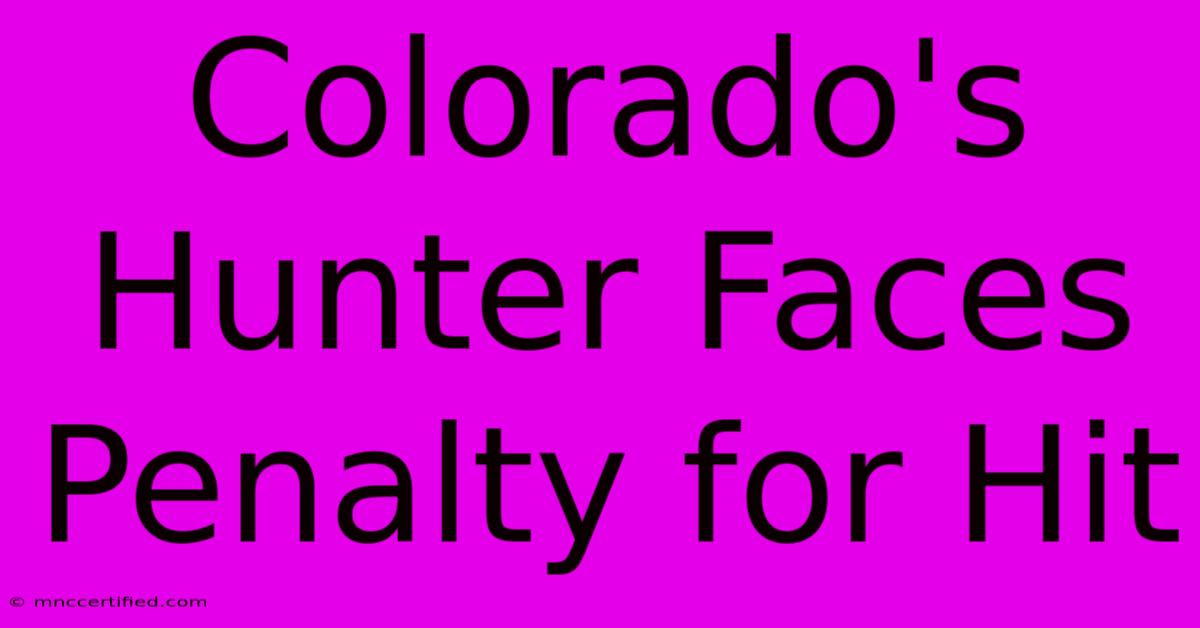Colorado's Hunter Faces Penalty For Hit

Table of Contents
Colorado Hunter Faces Penalty for Illegal Elk Hit: Understanding Wildlife Regulations
Colorado's stunning landscapes attract hunters from across the country, but with this privilege comes a significant responsibility to adhere to strict wildlife regulations. A recent incident involving a hunter illegally hitting an elk highlights the importance of understanding and complying with these rules. This article delves into the details of the case, explores the potential penalties involved, and underscores the crucial role of responsible hunting in preserving Colorado's wildlife.
The Details of the Illegal Elk Hit
While specifics may vary depending on the ongoing investigation and any official reports released, news outlets have reported on a Colorado hunter who allegedly struck an elk illegally. The incident likely involves a violation of Colorado Parks and Wildlife (CPW) regulations concerning hunting seasons, licensing, methods of hunting, or even the proper disposal of harvested animals. The exact nature of the violation will determine the severity of the penalties. It's crucial to remember that details surrounding such cases often emerge gradually, and accurate information should be sourced from reputable news outlets and official CPW statements.
Potential Violations and Associated Penalties
Several potential violations could be associated with an illegal elk hit in Colorado. These include:
- Hunting out of season: Hunting elk outside the designated hunting season is a serious offense. Penalties can include hefty fines, license revocation, and even potential jail time.
- Lack of proper license or tags: Hunting without a valid license and the necessary tags for the specific animal is a violation resulting in substantial fines and potential license suspension.
- Illegal hunting methods: Using prohibited methods like spotlights, baiting, or hunting from a vehicle are severe offenses with corresponding harsh penalties.
- Improper disposal of game: Failure to properly tag, field dress, and report a harvested animal can also lead to legal consequences.
The specific penalties will depend on the nature and severity of the violation(s), the hunter's prior record, and the discretion of the court or CPW.
The Importance of Responsible Hunting in Colorado
The incident serves as a stark reminder of the importance of responsible hunting practices. Maintaining Colorado's abundant wildlife populations requires adherence to strict regulations, promoting ethical hunting practices, and preserving the integrity of the state's wildlife management system.
Understanding Colorado's Wildlife Regulations
Before heading out for any hunting trip in Colorado, hunters must thoroughly familiarize themselves with the CPW regulations. This includes:
- Obtaining the correct licenses and tags: This ensures legal hunting and contributes to the funding of wildlife conservation efforts.
- Understanding season dates and bag limits: Knowing the specific hunting periods for each species and respecting bag limits is crucial.
- Familiarizing oneself with hunting methods: Understanding the permitted methods ensures ethical and safe hunting practices.
- Knowing the rules regarding the handling and disposal of harvested game: This ensures accurate reporting and contributes to wildlife management data.
Resources such as the CPW website, hunting guides, and educational workshops are excellent sources of information.
The Impact on Wildlife Conservation
Illegal hunting undermines conservation efforts. Poaching and unethical hunting practices threaten wildlife populations, disrupting natural ecosystems, and impacting the long-term sustainability of hunting opportunities. Compliance with regulations ensures healthy wildlife populations and the continuation of a sustainable hunting tradition in Colorado.
Conclusion: Respecting Colorado's Wildlife Heritage
The case of the Colorado hunter facing penalties for an illegal elk hit emphasizes the vital importance of respecting wildlife regulations. Responsible hunting is crucial for preserving Colorado's natural heritage and ensuring the sustainability of its wildlife resources for future generations. Hunters must prioritize adherence to regulations, embrace ethical hunting practices, and contribute to the responsible management of Colorado's unique wildlife. By doing so, they help protect the state's magnificent wildlife and ensure the continuation of the hunting tradition for years to come.

Thank you for visiting our website wich cover about Colorado's Hunter Faces Penalty For Hit. We hope the information provided has been useful to you. Feel free to contact us if you have any questions or need further assistance. See you next time and dont miss to bookmark.
Featured Posts
-
Do You Need Boat Insurance In Ohio
Nov 17, 2024
-
Razorbacks Fall Arkansas Vs Texas Live Updates
Nov 17, 2024
-
Watch Tottenham Women Vs Arsenal Game Info
Nov 17, 2024
-
Sacramento Kings Foxs 60 Point Record
Nov 17, 2024
-
Moonflower Murders Cosy Crime And Mystery
Nov 17, 2024